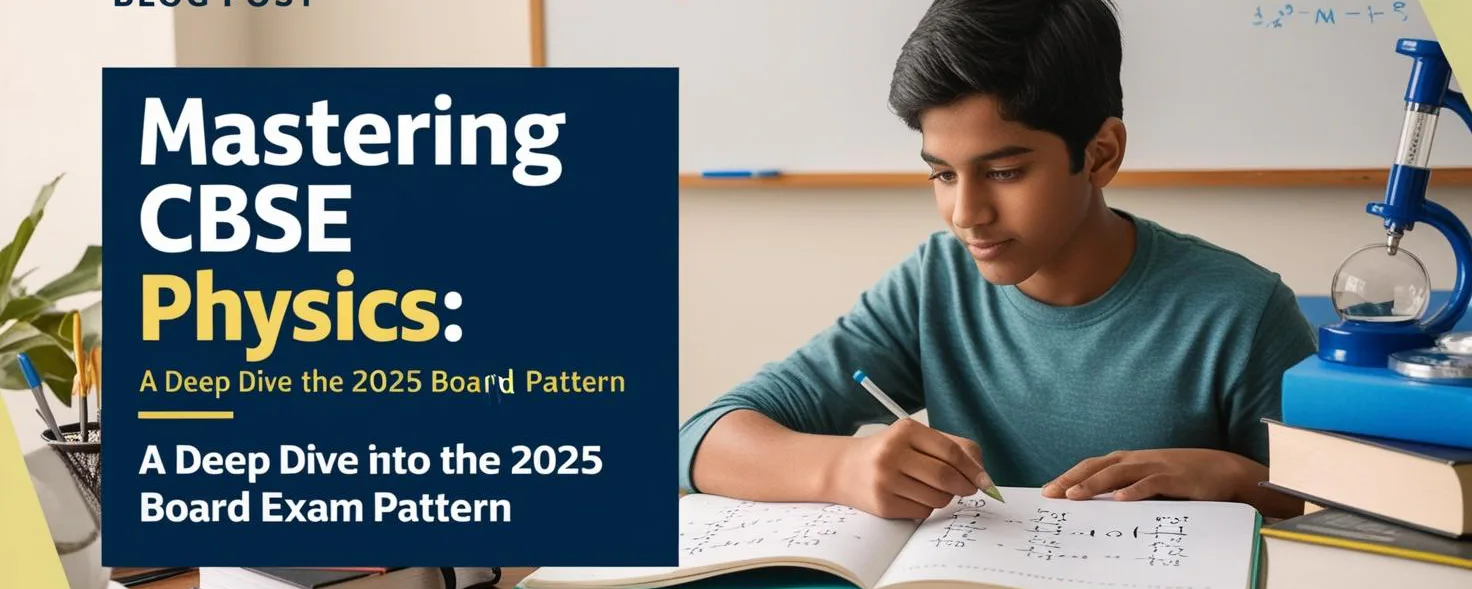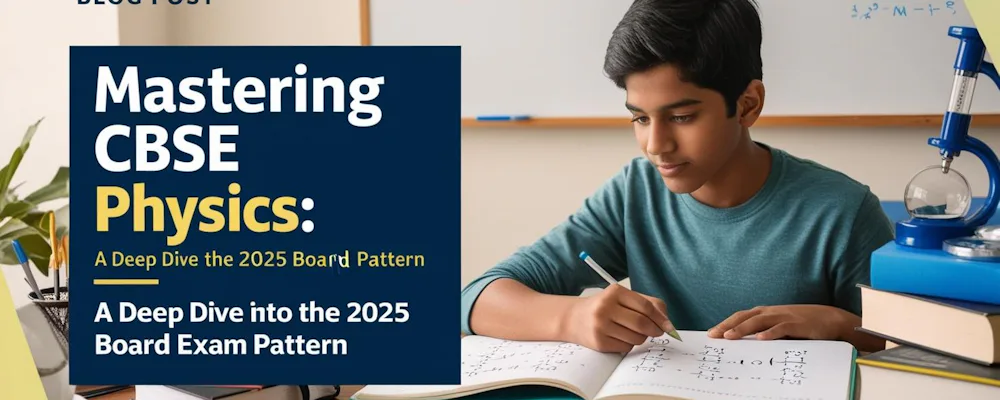
Your comprehensive guide to understanding and conquering the Physics paper The Evolving Landscape of CBSE Physics As board exams approach, the anxiety surrounding the Physics paper often reaches a fever pitch among students. It's a subject that has traditionally challenged even the most dedicated learners, combining complex theoretical concepts with intricate numerical problems. The 2025 paper pattern reveals interesting shifts from previous years, showing a thoughtful evolution in how students' understanding of Physics is tested. Recent trends indicate a move away from pure theoretical knowledge toward more application-based and analytical questioning. While previous years focused heavily on direct formula applications, the current pattern emphasizes conceptual clarity and real-world applications. This year's paper strikes a careful balance between testing fundamental understanding and challenging students to think critically about physics in everyday contexts. What sets the 2025 pattern apart is its increased focus on integrated learning. The Power of Personalized Learning In navigating these evolving challenges, we've observed that students achieve their best results when they receive individualized attention that adapts to their unique learning style. This observation forms the cornerstone of Pracbee's teaching philosophy. Our one-on-one sessions are specifically designed to help students master both the fundamental concepts and the analytical thinking skills that the current CBSE Physics pattern demands. Through our personalized approach, we've consistently seen students transform their understanding of Physics from a collection of daunting formulas into an interconnected web of logical concepts. Our experienced educators work closely with each student, identifying their specific challenges and crafting tailored strategies that make even the most complex topics accessible and manageable. Comprehensive Paper Analysis Pattern Analysis and Structure The 2025 CBSE Physics paper demonstrates a carefully balanced approach to testing students' knowledge and analytical abilities. Here's a detailed breakdown of the structure: Section Distribution Section A (Questions 1-16): Multiple Choice Questions Tests fundamental concept understanding Quick recall and application of basic principles Requires precise knowledge of formulas and their applications Strategic importance: Build initial confidence and momentum Section B (Questions 17-21): Very Short Answer Questions Focus on concise explanation of key concepts Direct application of formulas Tests clarity of basic understanding Requires precise and accurate responses Section C (Questions 22-28): Short Answer Questions Deeper conceptual understanding Problem-solving with multiple steps Integration of related concepts Application to real-world scenarios Section D (Questions 29-30): Case Study Based Questions Analysis of practical situations Integration of multiple concepts Critical thinking and problem-solving Real-world applications of physics principles Section E (Questions 31-33): Long Answer Questions Comprehensive understanding of topics Complex problem-solving skills Detailed explanations and derivations Integration of multiple concepts Topic-wise Analysis and Preparation Strategy 1. Electromagnetic Induction and Related Concepts (High Weightage) Key Focus Areas: Transformers: Principle, working, and efficiency calculations AC circuits: RMS values, impedance, and power factor Electromagnetic waves: Properties, applications, and mathematical treatment Preparation Tips: Master the fundamental principles and mathematical formulations Practice numerical problems with varying complexity Focus on graphical analysis and interpretation Understand practical applications and real-world examples 2. Semiconductor Physics Critical Topics: P-N junction characteristics and applications Semiconductor devices: Diodes, transistors Device applications in circuits Forward and reverse bias conditions Study Approach: Build strong theoretical foundation Practice characteristic curve analysis Understand device working principles Focus on practical applications 3. Electrostatics and Current Electricity Essential Concepts: Electric fields and potentials Capacitors and capacitance Circuit analysis and problem-solving Application of Kirchhoff's laws Learning Strategy: Focus on conceptual clarity Practice numerical problems extensively Understand graphical representations Master mathematical derivations Difficulty Level Distribution Easy Questions (40%) Direct formula applications Basic concept testing Single-step calculations Standard theoretical questions Preparation Strategy: Ensure thorough understanding of fundamentals Practice quick solving techniques Focus on accuracy and time management Regular revision of basic concepts Moderate Questions (60%) Multi-step problem solving Concept application Analytical thinking Graphical interpretation Approach: Develop systematic problem-solving methods Practice varied question types Focus on concept integration Time management strategies Mastery Tips: Regular practice of complex problems Focus on concept interconnections Develop analytical thinking skills Time management for lengthy solutions Pracbee's Targeted Preparation Approach At Pracbee, we understand that success in CBSE Physics requires more than just theoretical knowledge. Our 1:1 classes focus on: Personalized Learning Plans Custom study schedules based on individual strengths and weaknesses Targeted practice for challenging topics Regular assessment and progress tracking Adaptive teaching methods Concept Mastery In-depth coverage of high-weightage topics Real-time doubt resolution Interactive learning sessions Practical applications and examples Exam Strategy Development Time management techniques Question paper analysis Pattern-based practice Mock test series Performance Enhancement Regular progress assessment Weakness identification and improvement Confidence building Stress management techniques Conclusion The 2025 CBSE Physics paper pattern emphasizes conceptual understanding, analytical thinking, and practical application of knowledge. Success requires a well-planned approach, thorough preparation, and expert guidance. With Pracbee's personalized 1:1 teaching methodology, students receive the focused attention and customized support needed to excel in their board examinations. For detailed information about our specialized Physics coaching programs, visit www.pracbee.com or contact our academic counselors at [email protected] or call us at +91-9650647200

Navigate the latest CBSE Physics board paper for 2025. In-depth analysis of marking scheme, practical assessment, and topic-wise preparation guidance.